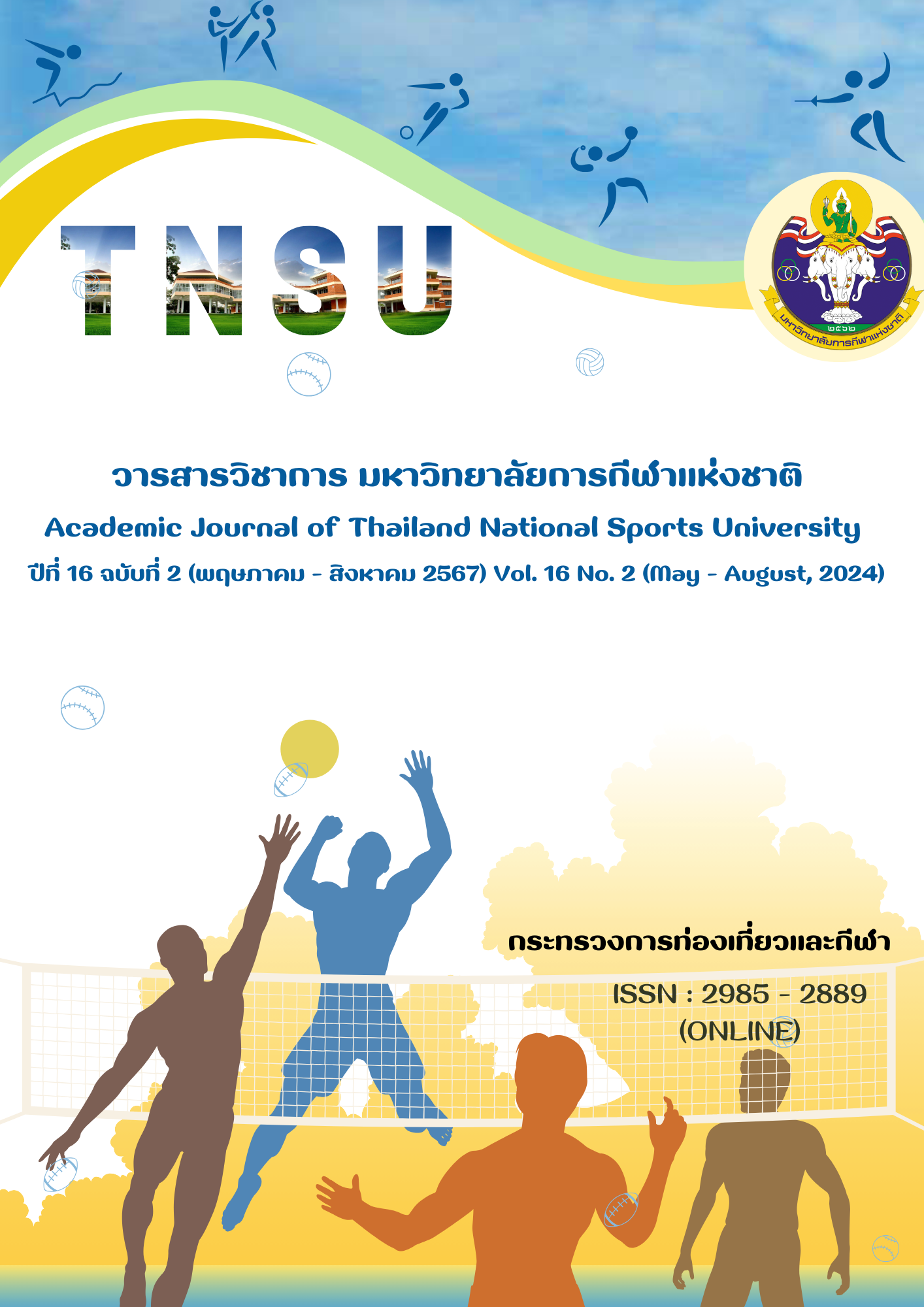ผลของการจัดการเรียนรู้ฐานสมรรถนะร่วมกับแนวคิดการเรียนรู้โดยใช้กรณีศึกษาเป็นฐานที่มีต่อผลสัมฤทธิ์ทางการเรียนสุขศึกษาและการรู้เท่าทันสื่อของนักเรียนมัธยมศึกษา
Main Article Content
บทคัดย่อ
การวิจัยครั้งนี้มีวัตถุประสงค์ เพื่อศึกษาผลการจัดการเรียนรู้ฐานสมรรถนะร่วมกับแนวคิดการเรียนรู้โดยใช้กรณีศึกษาเป็นฐานที่มีต่อผลสัมฤทธิ์ทางการเรียนสุขศึกษาและการรู้เท่าทันสื่อของนักเรียนมัธยมศึกษา โรงเรียนปักธงชัยประชานิรมิต ตัวอย่างคือ นักเรียนมัธยมศึกษาปีที่ 3 จำนวน 70 คน โดยการสุ่มกลุ่มตัวอย่างแบบกลุ่ม (Cluster Sampling) แบ่งเป็นกลุ่มทดลองที่ได้รับการจัดการเรียนรู้ฐานสมรรถนะร่วมกับแนวคิดการเรียนรู้โดยใช้กรณีศึกษาเป็นฐาน จำนวน 35 คนและกลุ่มควบคุมได้รับการจัดการเรียนรู้วิชาสุขศึกษาแบบปกติ จำนวน 35 คน เครื่องมือที่ใช้ในการวิจัย คือ แผนการจัดการเรียนรู้ฐานสมรรถนะร่วมกับแนวคิดการเรียนรู้โดยใช้กรณีศึกษาเป็นฐาน จำนวน 8 แผน และแบบวัดผลสัมฤทธิ์ทางการเรียนวิชาสุขศึกษาด้านความรู้ เจตคติ การปฏิบัติ และการรู้เท่าทันสื่อ ระยะเวลาในการดำเนินการวิจัย 8 สัปดาห์ วิเคราะห์ข้อมูล โดยใช้ค่าเฉลี่ย ส่วนเบี่ยงเบนมาตรฐานและทดสอบความแตกต่างค่าเฉลี่ยของคะแนนด้วยค่าที
ผลการวิจัยพบว่า ค่าเฉลี่ยของคะแนนผลสัมฤทธิ์ทางการเรียนวิชาสุขศึกษาด้านความรู้ เจตคติ การปฏิบัติและการรู้เท่าทันสื่อหลังการทดลองของนักเรียนกลุ่มทดลองสูงกว่าก่อนการทดลองอย่างมีนัยสำคัญทางสถิติที่ระดับ .05 และค่าเฉลี่ยของคะแนนผลสัมฤทธิ์ทางการเรียนวิชาสุขศึกษาด้านความรู้ ด้านเจตคติ การปฏิบัติและการรู้เท่าทันสื่อหลังการทดลองของนักเรียนกลุ่มทดลองสูงกว่ากลุ่มควบคุมอย่างมีนัยสำคัญทางสถิติที่ระดับ .05 สรุปผลการวิจัยการจัดการเรียนสุขศึกษาโดยใช้การจัดการเรียนรู้ฐานสมรรถนะร่วมกับแนวคิดการเรียนรู้โดยใช้กรณีศึกษาเป็นฐาน ส่งผลให้ผลสัมฤทธิ์ทางการเรียนและการรู้เท่าทันสื่อของนักเรียนชั้นมัธยมศึกษาปีที่ 3 สูงกว่าการจัดการเรียนรู้สุขศึกษาแบบปกติ
Article Details

อนุญาตภายใต้เงื่อนไข Creative Commons Attribution-NonCommercial-NoDerivatives 4.0 International License.
บทความที่ได้รับการตีพิมพ์เป็นลิขสิทธิ์ของวารสารวิชาการ มหาวิทยาลัยการกีฬาแห่งชาติ ข้อความที่ปรากฏในบทความแต่ละเรื่องในวารสารวิชาการเล่มนี้ เป็นความคิดเห็นส่วนตัวของผู้เขียนแต่ละท่านไม่เกี่ยวข้องกับวารสารวิชาการมหาวิทยาลัยการกีฬาแห่งชาติ แต่อย่างใด ความรับผิดชอบองค์ประกอบทั้งหมดของบทความแต่ละเรื่องเป็นของผู้เขียนแต่ละท่าน หากมีความผิดพลาดใดๆ ผู้เขียนแต่ละท่านจะรับผิดชอบบทความของตนเองแต่ผู้เดียว
เอกสารอ้างอิง
Child and Youth Media Institute. (2017). Framework: Media information and digital literacy. Retrieved from https://www.childmedia.net/archives/205
Dhanakorn Srisooksai. (2022). Media literacy: Promoting wisdom vaccine for society. Thai Media Fund Journal, 1(1), 1 - 21.
Independent Committee for Education Reform. (2019). Independent committee’s mission report for education reform. Retrieved from https://backoffice.onec.go.th/uploads/Book/1734-file.pdf
Jintana Sarayuthpitak. (2022). School health Programs. Chulalongkorn University printing house.
Thai Health Promotion Foundation. (2020). 5 Component of Media Literacy. Retrieved from https://www.thaihealth.or.th/Content/39558
The government gazette. (2016, 29 December). The National Economic and Social Development Plan No.12 (2017,- 2021). volume 133.
Timothy Vail. (2019). Self - paced English as a foreign language in a competency - based education program for Korean learners. The Journal of Competency - Based Education, 4(3), 1 - 10.
Office of the Basic Education Commission. (2015). The study of the learning in 21st Century Skills. Retrieved from https://secondary.obec.go.th/newweb/wp-content/uploads/ 2017/12/E-CEN21book.pdf
Office of the Education Council (2007). Problem-based Learning. Retrieved from http://thesis.swu.ac.th/swuebook/h234917v3.pdf
Pitsini Mano. (2019). Effects of changes in the era digital disruption for education. Journal of Industrial Education, 18(1).
Sansiri Inunchot, Morakot Saewan, Sabaitip Kolaka, Pariwan Butsat, & Sutthiporn Thanthong. (2021). The development of instructional processes by using constructionism and case - based learning to enhance the innovative creation ability. Suan Sunandha Academic Journal of Education, 5(1), 74 - 85.
Sirichai Kanjanawasee. (2013). Classical test theory. Chulalongkorn University printing house.
Vilaiwan Siriaurd. (2019). Effects of health education learning management using flipped classroom on learning achievement and critical thinking of tenth grade students (Master’s thesis), Chulalongkorn University. Retrieved from http://cuir.car.chula.ac.th/handle/123456789/70048


